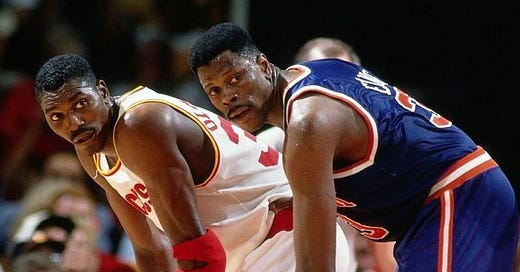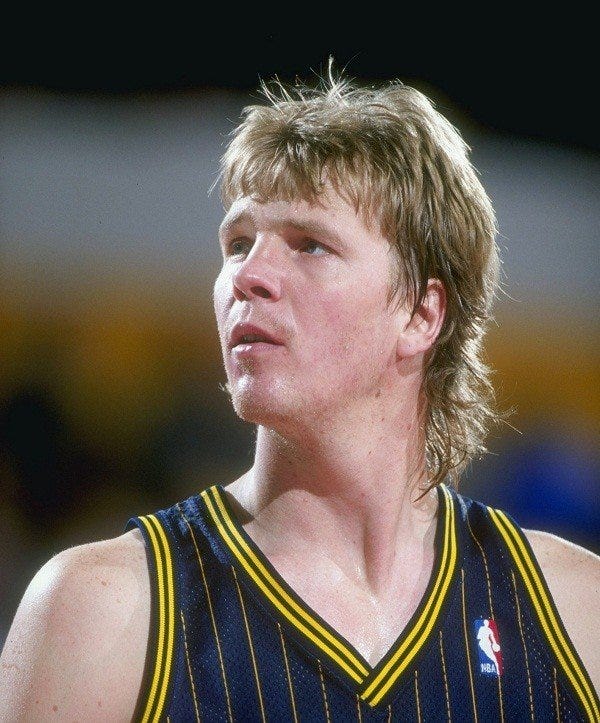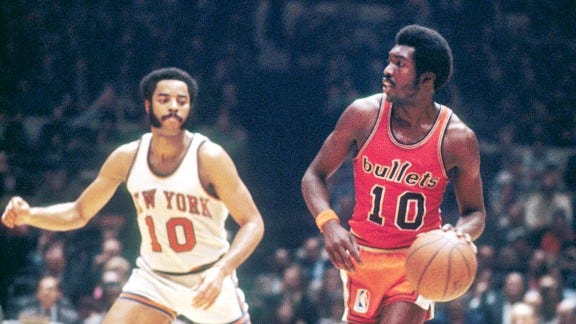The Greatest Villains in Knicks History
Trae Young got under our collective skin in May...but did he do enough to make the Top 10?
Good morning, and Happy Labor Day!
I hope everyone is enjoying their holiday weekend. I celebrated by getting back to work…to the Knicks Film School Podcast, that is. I’d taken the last two weeks off to concentrate on my family’s move to Brooklyn, but now that we’re somewhat settled, I got back on the saddle. Be sure to check out the latest episode anywhere you get your podcasts or on YouTube (and feel free to drop a 5-star rating and/or a review if you enjoy!)
And as always, if you’d like to become a full subscriber to this newsletter and start receiving it every weekday (training camp is just three weeks away!), you know what to do:
🗣 News & Notes ✍️
🏀 The dog days of the offseason continue, so no news to report today, but if summer workout videos are your cup of tea, you won’t find many better than this from the NBA’s trainer to the stars, Chris Brickley:

Right into the veins, please.
The Greatest Villains in Knicks History
The question to start us off this week comes from Jeremy, who opens a giant can of worms when he asks:
Where does Trae Young rank on the all time Knicks villain list?
Did Jeremy ask this question knowing full well that my favorite way to waste time is by diving deep into Basketball Reference rabbit holes with no hope or intention of coming up for air? Who can say for sure. But whatever it is, his question sent me on a mission.
I’ll admit, even for a devoted basketball historian like myself, the thought of parsing out every single Knicks villain into a top 10 list was beyond daunting. Given that Young only became a villain where all great villains are made - in the playoffs - I decided that I would limit the scope of the question to that: The 10 Greatest Postseason Villains in Knicks History.
This certainly made my life easier, but by no means was the job a simple one. For starters, what sort of criteria is appropriate here? It can’t simply be most points scored or highest average, because some of the greatest villains in Knick playoff history left their mark in a relatively small number of games, and for others, the points they did or didn’t score were secondary to the indelible imprint they left for other reasons entirely.
This is a long way of saying I went largely by feel. Villainy is unquantifiable, after all.
Another caveat: I’ve only been watching this team since the early 90’s, so for a few of the names on the list, I had no choice but to go by some straight data. I may be older than dirt, but the list would be incomplete without a few guys who did their damage before I started watching, or in a few cases, before I was even born.
On that note, some honorable mentions:
Trae Young: He deserves to have his name here, not only for the numbers (his 29.2 points per game career scoring average against the Knicks in the playoffs only trails three guys by the name of Moses, Kareem and Michael), but for the showmanship. As someone who watched Reggie do his thing and remembers it well, there was a lot of the same “we’re losing to this guy?!?”energy coming out of the first round this year.
Isiah Thomas: He had three run-in’s with the Knicks in the playoffs, but New York won two of those - the first when Bernard King averaged 46 points in the first round in 1984, and the second in 1992, when Thomas had a pretty dreadful series against Pat Riley’s first playoff squad. The lone win, in 1990, was a 5-game thrashing in the second round against a middling Knicks team that served as little more that a speed bump en route to Detroit’s second consecutive title. In other words, Thomas’ greatest acts of villainy came when he was running the team, not playing against it.
Alonzo Mourning: Played in 28 postseason games against the Knicks with 23 coming in a Miami Heat uniform, and aside from the top two guys on this list, no one had more 20-point outings against New York in the playoffs than Zo with 18. If this was a list of playoff foes that Knick fans have the greatest respect for, Mourning would be near the top. But a villain? Nah. The Georgetown brotherhood thing between him and Ewing was always there, and Zo was simply really hard to dislike, let alone hate. That emotion was reserved for other members of that Miami bunch who we’ll get to in due time.
Wes Unseld: No one in NBA history has played in more playoff games against the Knicks than Unseld, who faced off against New York 36 times in the postseason. For six consecutive years, the Bullets and Knicks played each other, and five of those times, Unseld went home a loser. None of those were more disappointing than in 1969, when Unseld, fresh off winning Rookie of the Year and MVP in the same season, got swept out of the playoffs as the East’s top seed. His lone win, in 1971, came largely due to the efforts of another man who we’ll see in a bit. It’s tough to be a great villain if you end up on the losing end so regularly, and while scoring certainly isn’t everything, it’s telling that Wes isn’t on the top 10 list of total postseason points scored against the Knicks despite all those games.
Rik Smits: Of all the images that float through my mind when I think of the word “villain,” the Dunkin’ Dutchman’s blonde mullet isn’t one of them.
That said, only Unseld appeared in more playoff games against the Knicks, so Smits deserves mention.
John Havlicek: Probably the most egregious admission from the list, which is fitting, since Havlicek is the most under-appreciated Hall of Famer in NBA history. Hondo still ranks 17th on the NBA’s all time scoring list, and of the players ahead of him, only Oscar, Kobe and LeBron have more assists. The bridge between two different eras of Celtic championship basketball faced off against the Knicks five times between 1967 and 1974, winning three and losing two. Three times the winner of those series went on to win it all.
But he ends up as the final omission because not once have I ever heard a story on any broadcast from Clyde or any other old-timer about how Havlicek struck fear into their hearts or how they saw him as this great hurdle they needed to get over to reach the promised land. Maybe if I was 20 years older, he’d be on the list, but in that case I’d also probably be drooling on my laptop and you wouldn’t be reading this newsletter.
Enough foreplay. Let’s get to the top 10, starting with the first athlete to ever rip my heart out and serve it to me on a silver platter…
10. Hakeem Olajuwon
Playoff games against Knicks: 7
Playoff points scored against Knicks: 188 (45th)
20-point playoff games against Knicks: 7 (T-21st)
If you just look at his stats from the ‘94 Finals - 26.9 points, 9.1 rebounds, 3.6 assists, 1.6 steals and 3.9 blocks - you’d be impressed enough.
But when you look at those numbers again, and in particular the scoring and assists, in the context of where NBA offenses were at the time, you gain an entirely different appreciation for Hakeem’s level of dominance in that series.
Compare the 2021 playoffs, when only three teams averaged under 106 points per game and 10 averaged over 110, with the 1994 postseason, when all but three teams averaged under 98 points. No Finals game saw a team crack 93 points, and no Rocket averaged even half as much as Olajuwon’s 26.9. The four players who counted as Houston’s next most threatening offensive pieces - Vernon Maxwell, Robert Horry, Kenny Smith and Sam Cassell - shot a combined 36.6 percent from the field. Hakeem was a one-man band.
But even putting aside all that, Olajuwon makes the list based off of a lone series because for a decade, every Knicks fan wanted to believe that our guy was the best. All he needed was a chance to prove it on the biggest stage. Ewing got that chance, and after seven games, there was no doubting the order of the league’s top centers from that point forward. Sad but true.
9. Bill Russell
Playoff games against Knicks: 10
Playoff points scored against Knicks: 135 (70th)
20-point playoff games against Knicks: 2 (T-65th)
There’s a million stats you could toss out to show Russell’s greatness among the legends of NBA history, but here’s one million and one: He had more rebounds in 10 career playoff games against the Knicks than Horace Grant had in 26 such matchups and Rik Smits had in 35 outings.
69 players have scored more postseason points against the Knicks than Russell, and yet how many times have we heard Clyde talk about the Celtics’ center as the one who stood in their way before New York’s championship teams could finally get over the hump? He played that role for quite a few franchises around the league, much like another Knick villain who appears higher on the list did a generation later.
Russell is down here though because the Knicks only faced him in the playoffs twice - once in 1967 in that group’s first foray into the postseason waters, and again two years later, when New York thought they had what it took to win it all, only for an aging Russell to beat them in the conference finals on his way to one last ring.
New York eventually got the better of most of the names who appear on this list, but not Russell. The greatest winner in sports history just didn’t lose all that often.
8. Wilt Chamberlain
Playoff games against Knicks: 23
Playoff points scored against Knicks: 471 (8th)
20-point playoff games against Knicks: 13 (T-9th)
Our third center in a row and the last one to appear on the list, Wilt is here as much for being on the wrong end of the most famous moment in Knicks history as anything else.
Prior to May 7, 1970, Wilt Chamberlain was probably considered by most fans of the sport to be the greatest player in basketball history. He had already amassed nearly 27,500 points in the NBA, which was miles ahead of the next closest player at that time.
His villainy in New York was also cemented in stone. In his first ever NBA game, Chamberlain scored 43 points and pulled down 28 rebounds against the Knicks, and his rookie high of 58 points came later in the year against them as well. That point total would look quaint a few years later, when Wilt put up his famed C-note against New York in Hershey, Pennsylvania. Then in 1968, Chamberlain averaged a pedestrian (for him ) 25 & 24 in helping the 62-win Sixers beat the Knicks 4-2 in the Eastern Semis before falling yet again to Bill Russell and the Celtics.
So when a Garden full of fans was awaiting the start of Game 7 in the 1970 NBA Finals, just two days after the Big Dipper put 45 and 27 on their heads in a 22-point Laker blowout, the expectation was that this would be the latest chapter in Wilt’s storybook of dominance.
Thankfully, Willis Reed had other ideas.
After a one-legged Reed defeated Chamberlain in that game, it almost didn’t matter that Wilt got his payback when LA beat New York in five games to capture the ‘72 Finals. It also made it fitting that Reed would literally close the book on Chamberlain’s career a year later, when the Knicks again beat the Lakers to win it all.
13 years after scoring 58 as a rookie against the Knicks, Wilt scored just 58 points in that entire series, his last games as an NBA player. Even with that ending, it’s impossible to keep Chamberlain off this list. His all time average of 22.7 rebounds against the Knicks over 26 playoff games still dwarfs everyone else, and his 59.3 field goal percentage is still tops among anyone who has faced New York in at least 20 playoff games.
Still, he’s the Goliath of NBA history not only because of his dominance, but because he got beat, far more often than many figured he should have been.
7. Larry Bird
Playoff games against Knicks: 16
Playoff points scored against Knicks: 448 (9th)
20-point playoff games against Knicks: 15 (T-6th)
A certain GOAT who we’ll be seeing higher up on the list carries with him the highest all time postseason scoring average against the Knicks of anyone who played more than one series against them, but Bird comes in a respectable second with a 28 point average, accumulated over 16 games across three series. He shot 54 percent on 2-pointers against New York in his postseason career, which is still the highest of any non-big in history.
These stats, plus Bird’s general persona as a guy who knew he could snatch your soul with the greatest of ease, are the reason he’s on the list at all. That’s because unlike some of the players who are higher up, neither of the Knick teams vanquished by Larry’s Celtics were expected to do much, so the heartbreak factor was minimal.
Bernard King did help New York take Bird and the eventual champion Celtics to seven games in the ‘84 conference semis, but that series wasn’t really all that close. Boston won its four home games by an average of 18 points, including a Game 7 win that was never in doubt. The Knicks eked out three wins at home, but Bird’s 39-point triple double in the deciding game was more than enough.
Four years later, Bird made quick work of Patrick Ewing in his first foray into the postseason, but two years after that, the big guy got his revenge with a first round win, including a Game 5 victory in the Boston Garden.
6. Earl Monroe
Playoff games against Knicks: 18
Playoff points scored against Knicks: 480 (7th)
20-point playoff games against Knicks: 15 (T-6th)
It’s hard to put into words juts how good Monroe was when he first came into the league. After being a near unanimous Rookie of the Year during an opening campaign that included a 56-piece against West, Elgin and the Lakers, Monroe was named to the All-NBA 1st Team in his second season. His Bullets also catapulted from 36 wins to a league-leading 57 thanks to Wes Unseld becoming Baltimore’s ROY and MVP.
In the playoffs though, they ran into a buzzsaw in the form of the New York Knicks. This is back when only four teams from each conference made it, so when New York swept Baltimore 4-0, that meant the NBA’s top team was eliminated without winning a single playoff game. Imagine if such a thing happened today!
That postseason was the first of three consecutive years that matched Monroe’s Bullets with Walt Frazier’s Knicks before the two became teammates. In the second matchup, Monroe again got the better of Frazier in the stat sheet, averaging 28 against the Knicks for the second consecutive year, but Baltimore again fell short in the first round, this time in seven games.
Then, in 1971, the tables finally turned. With a trip to the Finals and a matchup with Lew Alcindor’s mighty Milwaukee Bucks on the line, the Bullets beat the Knicks in seven games. Monroe led Baltimore with 26 points in the deciding affair, a 2-point win in MSG.
The Bullets-Knicks rivalry would last another three consecutive seasons, all with Monroe wearing blue and orange, and all victories for New York. But Earl the Pearl will always have 1971, the only time in a seven-year stretch when the Knicks were eliminated by someone other than Bill Russell or Wilt Chamberlain.
Check back tomorrow for Part II: The Top 5 Greatest Villains in Knicks Playoff History!
🏀
That’s it for today! If you enjoy this newsletter and like the Mets, don’t forget to subscribe to JB’s Metropolitan. See everyone soon! #BlackLivesMatter






